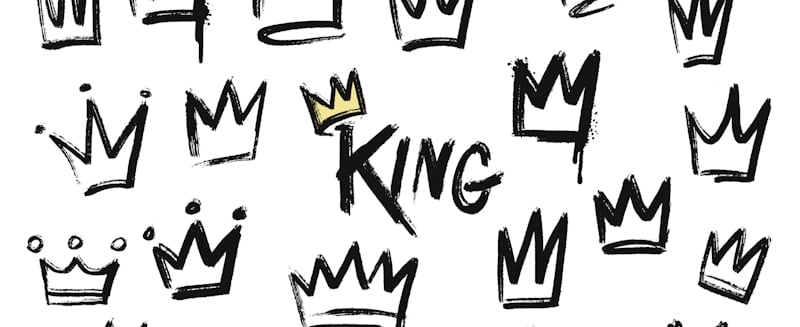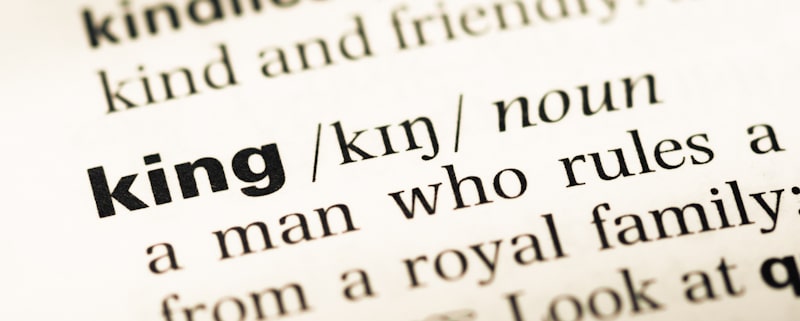Capitalization rules can be confusing. Sometimes you can find a word capitalized in a sentence. Similarly, you can find a lowercase version of the word. What are the capitalization rules for the word “king”? Throughout this article, we will discuss it.
You need to capitalize the word “king” when you use it along with the person’s name. It is because, in that case, “king” is a title. You will use lowercase when you use it without the name of the person.
It may be weird, but there’s an explanation for this rule. Let’s see how linguistics and grammar rules define this usage. Also, we will see that this is not the only word that follows this capitalization form.

Capitalization Rules For Titles
“King” is a monarchy title used to address the male leader of a kingdom. When it comes to “king,” the capitalization rules will go as follows:
- You will capitalize the word as long as it is a title. It occurs when you use the person’s name after the title or use a particular reference.
For example,
“Simeon The Great ruled the first Bulgarian empire.”
“King Arthur was one of the longest-reigning monarchs in history, the longest in Britain.”
- You will write the word in lower case if it is a noun you are using, meaning no specific reference to the person is given.
For example:
“A gentleman should always make his woman feel like a queen.”
Other Monarchy Titles
These rules apply to other monarchy titles such as:
- Queen
- Emperor
- Prince
- Duke
- Tsar
- Countess
- Great King
- Empress
- Princess
- Duchess
- Tsarina
- Count
- Marquess
- Lady
- Marchioness
- Lord
Other Capitalization Rules
Titles are not an exception in English grammar. There are other words that you should always capitalize regardless of their placement in the sentence.
Capitalization In Politics
For example, English will always start with a capital letter because we are talking about a language. The rule also applies to country names, cities, provinces, states, and so on. Additionally, when you write a nationality, you need to use the rule as well.
Some example sentences are:
- English is an Indo-European language, but it has many references to Greek and Latin.
- Regardless of popular belief, half of Russia belongs to the Asian continent.
- One of the most populated cities in the world is Tokyo.
- If you count all its territories, the United States is more extensive than China.
Capitalization In History
You will use capitalization to write about unique historical events. It applies when you write about armed conflicts such as the Vietnam War or the Six-Day War.
Also, suppose you want to write about the periods of the human era. In that case, you will refer to them as Prehistory and History. Our history happens to have four periods called Classical, Middle Ages, Early Modern, and Modern.
Here are other historical terms you should capitalize:
- The Stone Age
- The Bronze Age
- The Iron Age
- Ancient Greece
- Ancient Rome
- Persian Empire
- Byzantine Empire
- Early Middle Ages
- High Middle Ages
- Late Middle Ages
- Renaissance Humanism
- Protestant Reformation
- The European Renaissance
- The Enlightenment
- First Industrial Revolution
- Revolutionary Period
- Age of Imperialism
- Victorian Era
- Second Industrial Revolution
- World War I
- Great Depression
- World War II
- Contemporary Period
- Information Age
Some sample sentences are:
- Anything that occurred in the world before the invention of writing is called Prehistory.
- Ever since the information age started, the whole world has changed the way we do things.
- Many advances in human history occurred in Ancient Greece.
- Once the Renaissance Humanism movement started, people started to give more importance to education.
- The philosophical movements in the Age of Enlightenment played a crucial role in the world we know today.
- Today at school, we learned about World War I. It was incredibly sad to read the amount of people who perished.
- If I ever had to choose an era to live in, I would choose the Victorian Era.
- The Great Depression was a time when most of my favorite artists were active.
- The Bronze Age was a time where bronze was commonly used.
- Humanity lived in the Iron Age at the end of the three-age division of prehistory and protohistory.
Capitalization In The Calendar
Whenever you use the name of a day, you will use capital letters. The same thing occurs with the months of the year and holidays. Notice how we have referred to days, months, and holidays as “the.” It is because we consider them to be proper nouns.
Some sample sentences are:
- People believe Mondays are a bad day, but it is just as bad as you think it is.
- Kids are very excited about this years’ Halloween. They have already selected their costumes.
- To me, Christmas is a sad time because it reminds me of my late husband.
- I wish we didn’t have to wait until Friday to get groceries.
- I will celebrate my birthday during the month of August. I really don’t care if it is two months later.
Additional Capitalizations
Below we have a list of other grammar rules about capitalization:
- When writing about deities and religious figures such as Buddha, God, Allah.
- You should also use capitals when you write other titles, such as President or Prime Minister.
- You should also capitalize movie, book, and song titles.
- You should capitalize the cardinal points.
- When writing the names of clubs, organizations, or groups of any kind.
- The pronoun “I” should always be capitalized.
- To talk about astronomical concepts such as the names of planets, stars, constellations.
- Brand names
- Acronyms
Exceptions To The Capitalization Rules
There are exceptions to the capitalization rules. We have created a small list of the terms you shouldn’t capitalize:
- Seasons
- Centuries numbers
- Prepositions in titles
- Cardinal points when you use them for navigation purposes.
- Titles when they are written after the name of the person.
Other Example Sentences
Below we have a list of other sentences using the capitalization rules:
-
- Only God knows how many times I tried to convince him not to do it.
- The President of the United States, Joe Biden, was born in Scranton, Pennsylvania.
- My favorite book is The Little Prince. Every time I read it, I feel like it is a new story.
- The Lion King, The Beauty and The Beast, and We Are The World are just three movies I watched on repeat this weekend.
- My address is 2800 NW 56th Ave, Lauderhill, FL 33313.
- The Golden State Warriors, New York Yankees, Baltimore Orioles, The North Atlantic Treaty Organization, and The European Union are sports-related team names.
- It’s going to be the best party ever. I’m so excited I don’t even know what to wear.
- After much debate, The International Astronomical Union has determined Pluto is not a planet.
- The North Face is the best activewear brand I have yet to endorse.
- My brother was part of the Navy SEALs.
Frequently Asked Questions
Do you use capitals for king and queen?
Yes, you use capitals when referring to the title and name of the person. You will use lower case when you only use the title and not the person’s name.
Does the word prince need a capital letter?
It will be capitalized as long as you are talking about a person’s title. You should follow the same capitalization rules as queen, king, lord, and any other title.
Why do we capitalize words?
Capitalization is used to emphasize parts of the text that are important. This practice started around the 18th century.
Is the Queen always capitalized?
Not really. This word will follow the same capitalization rules we have explained.
Do you capitalize prime minister in a sentence?
Yes, you do. The Prime Minister will follow the same rules as any other title.
Conclusion
English capitalization can be tricky. Some of the basic rules are to capitalize the first word of every sentence and always use capital letters for proper nouns.
But, there are more words that you should capitalize for correct writing. When you refer to titles such as “king,” you will most likely find them capitalized. The rule says that it will go capitalized as long as it precedes the person’s name or any other particular information because it is a title. Like when you say, “The Queen of England.”
We hope you can understand more about how capitalization works in English. Good writing skills are a symbol of knowledge.
Shawn Manaher is the founder and CEO of The Content Authority. He’s one part content manager, one part writing ninja organizer, and two parts leader of top content creators. You don’t even want to know what he calls pancakes.


